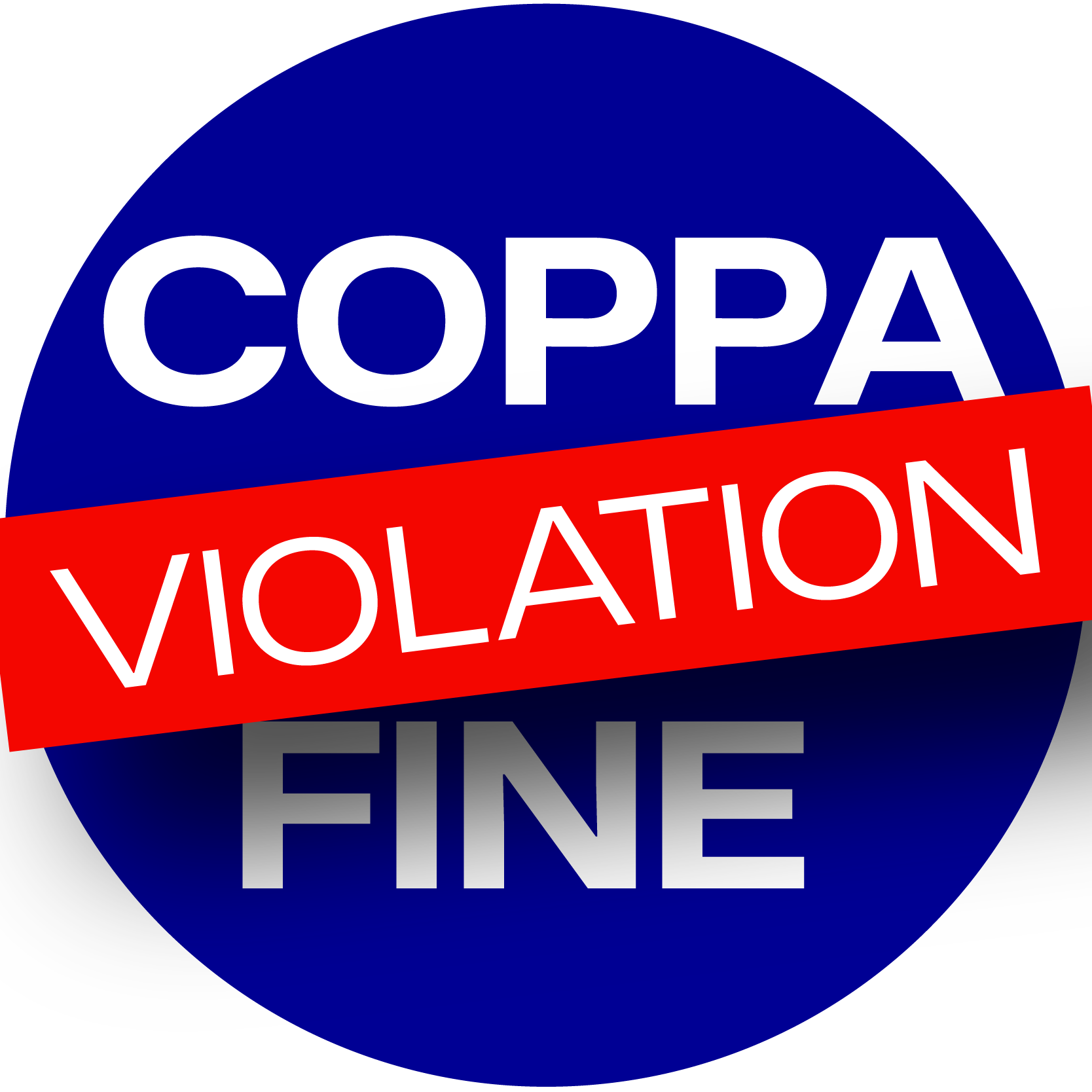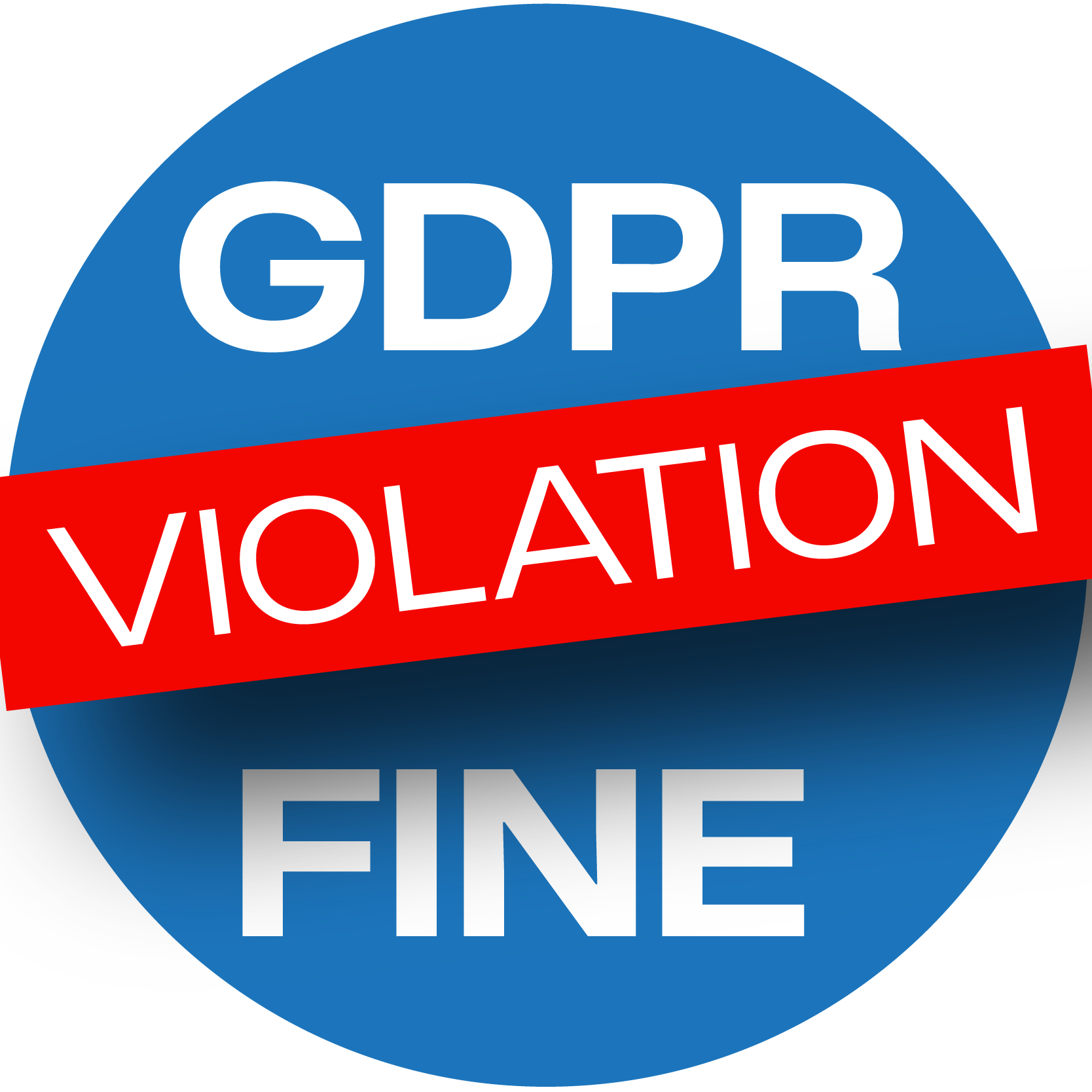History of Children's Privacy Violations
List of significant COPPA & GDPR violations as they relate to children.
Learn more about COPPA and GDPR enforcement and penalties by clicking here.

Monarch Services, Inc., Girls Life, Inc. & Looksmart Ltd.
October 4, 2001
$100,000
The companies are required to comply with COPPA in connection with any future online collection of personally identifying information from children under 13. The settlement also requires the operators to delete all personally identifying information collected from children online at any time since the Rule's effective date. These cases mark the first civil penalty cases the FTC has brought under the COPPA Rule.
Lisa Frank, Inc.
October 4, 2001
$30,000
American Pop Corn Company
February 14, 2002
$10,000
Ohio Art Company (Etch-a-Sketch)
April 22, 2002
$35,000
The Ohio Art Company was found collecting personal information from children registering for "Etchy's Birthday Club." The site collected the names, mailing addresses, e-mail addresses, age, and date of birth from children who wanted to qualify to win an Etch-A-Sketch toy on their birthday without parent permission.

Mrs. Fields Cookies
February 22, 2003
$100,000
Portions' of Mrs. Fields web sites were directed to children. The company allegedly collected personal information from more than 84,000 children, without first obtaining parental consent.
Hershey
February 22, 2003
$85,000
Hershey operates more than 30 Web sites - many of which are candy-related sites directed to children. On a number of these sites, the company allegedly employed a method of obtaining parental consent that does not meet the standard delineated under the COPPA Rule.
UMG Recordings, Inc.
February 18, 2004
$400,000
UMG Recordings operates hundreds of general audience Web sites that advertise and promote its music and artists, many of whom are popular with children.
UMG gained actual knowledge that a child was registering on the site whenever a child entered a birth date indicating he was under the age of 13. Yet, UMG collected this personal information from children without first notifying parents and obtaining verifiable parental consent.
Bonzi Software
February 18, 2004
$75,000
Xanga
September 7, 2006
$1,000,000
Xanga is a social networking site that collected, used and disclosed information from children under 13. This is the first million-dollar penalty since COPPA was enacted.
Industrious Kid, Inc.
January 30, 2008
$130,000
The web site in the violation was advertised as a “free, secure, social networking and blogging destination specifically designed for kids ages 8 to 14.” however collected and maintained personal information from children under the age of 13 without first notifying parents and obtaining their consent.
Sony BMG Music
December 11, 2008
$1,000,000
The Commission’s complaint alleges that, through its music fan Web sites, Sony Music improperly collected, maintained and disclosed personal information from thousands of children under the age of 13, without their parents’ consent.
Iconix Brand Group
$250,000
October 20, 2009

Tiny Co
September 17, 2014
$300,000
Tiny Co runs many games and applications including Tiny Pets, Tiny Zoo, Tiny Village, Tiny Monsters and more. In exchange for in-app currency to buy game enhancements, TinyCo encouraged kids to turn over their email addresses, but the company didn't get parental permission as required by COPPA.
Yelp
September 17, 2014
$450,000
The lawsuit also alleged that Yelp didn’t adequately test its apps to ensure that users under the age of 13 were prohibited from registering.
InMobi
June 22, 2016
$950,000
The FTC charged the company for deceptively tracking the locations of hundreds of millions of consumers – including children – without their knowledge or consent to serve them geo-targeted advertising.
Operation Child Tracker
September 13, 2016
Operation Child Tracker was a two-year investigation by the Attorney General’s office, discovered that websites operated by Mattel, Viacom, Hasbro and Jumpstart were home to tracking technology that illegally enabled third-party vendors, such as marketers or advertising companies, to track children’s online activity in violation of COPPA.
Mattel
$250,000
Viacom
$500,000
Hasbro
No fine
Jumpstart
$85,000

Explore Talent
February 5, 2018
$500,000
Along with collecting names, contact information and age, the company also asked users for their mailing address, weight, “body type,” and measurements for waist, hips, bust, shirt, etc. In addition, they urged users to upload a photo because “agents & casting directors choose only serious candidates with pictures. All of this was done without collecting parent permission.
Vtech
February 5, 2018
$650,000
The company was found collecting information from children without parents permission through connected toys violating children's privacy.
Unixiz Inc. (i-Dressup)
August 3, 2018
$35,000
Oath (AOL)
December 1, 2018
$5,000,000
TechCrunch’s Verizon-owned parent, Oath, an ad tech division made from the merging of AOL and Yahoo, has agreed to pay around $5 million to settle charges that it violated a federal children’s privacy law.
The penalty was the largest ever issued under COPPA.
Musical.ly (TikTok)
Feb. 27, 2019
$5,700,000
The video social networking company illegally collected personal information from children.
This is the largest civil penalty ever issued in a children’s privacy case.
Last updated January 21, 2025


Maker of the video game Genshin Impact unfairly marketed loot boxes to children and teens and failed to notify parents and obtain verifiable parental consent before collecting and using any personal information collected from children. In addition, HoYoverse shared with third-party analytics firms and advertisers user IDs as well as device-related persistent identifiers to track players’ progress, purchases, settings, and friends lists. Read more

NGL, agreed to pay $4.5 million to the FTC, which will be used to provide redress to consumers, and a $500,000 civil penalty to the Los Angeles DA’s office. In addition, they must stop marketing to kids and teens. NGL violated COPPA, Section 5 of the FTC Act, and the Restore Online Shoppers’ Confidence Act (“ROSCA”) for making no attempt to verify the age of its users, failed to obtain parental consent to collect and use personal data collected from children under 13, failed to honor parents’ request to delete their children’s personal data, retained children’s data longer than reasonably necessary to fulfill the purpose for which the data was collected, and unfairly marketed the service to children and teens. exposing them to cyberbullying and harassment.
Read more

Violated the California CCPA and COPPA by collecting and sharing children’s data without parental consent in their popular mobile app game “SpongeBob: Krusty Cook-Off.”
Read more

The Irish Data Protection Commission (DPC) adopted its final decision regarding its inquiry into TikTok (TTL).
The decision records findings of infringement of Articles 5(1)(c), 5(1)(f), 24(1), 25(1), 25(2), 12(1), 13(1)(e) and 5(1)(a) GDPR. The decision further exercises the following corrective powers: A reprimand; An order requiring TTL to bring its processing into compliance by taking the action specified within a period of three months from the date on which the DPC’s decision is notified to TTL; and administrative fines totalling €345 million. Read more

Illegally collected personal information from children without their parents’ consent. The proposed order will require Microsoft to bolster protections for children; makes clear that avatars and biometric and health data are protected under COPPA. Read more

FTC and DOJ Charge Amazon with violating COPPA by keeping kids’ Alexa voice recordings forever and undermining parents’ deletion requests. Proposed order to require Amazon to pay $25 million and delete children’s data, geolocation data, and other voice recording. Read more

The proposed order includes a $6 million monetary penalty, which will be suspended due to the company’s inability to pay in addition to other order provisions, which will provide protections for children’s data should Edmodo resume operations in the United States. Read more

TikTok hit with $15.7M UK fine for misusing children’s data. More than one million UK children under 13 estimated by the ICO to be on TikTok in 2020, contrary to its terms of service. Personal data belonging to children under 13 was used without parental consent and they failed to provide proper information to people using the platform about how their data is collected, used, and shared in a way that is easy to understand. TikTok “did not do enough” to check who was using their platform and take sufficient action to remove the underage children that were. Read more

Epic will pay a $275 million penalty for violating children’s privacy law, change default privacy settings, and pay $245 million in refunds for tricking users into making unwanted charges.
Read more

The Irish Data Protection Commission (DPC) has issued a penalty of €405m (£349m) against Instagram in relation to an alleged failure to protect children’s data. Children (users between 13 and 17 years old) using Instagram were allowed to activate “business accounts”; however, given default privacy settings for business accounts, operating such accounts, resulted in the publication of child user’s personal contact information (e.g.; phone number and/or email address). As part of the Instagram user registration process, the platform had a setting through which child user accounts could, by default, be “public”. In such instances, the individual (child) user would have to know to change the account settings to “private”.
Violated the GDPR for failing to adequately secure teenage users’ data in line with the General Data Protection Regulation (GDPR). Read more

WW International — previously Weight Watchers — has agreed to pay $1.5 million to resolve claims from the Federal Trade Commission (FTC) that it illegally gathered the data of underage users of its Kurbo program. Read more

California-based online advertising platform OpenX Technologies, Inc. will be required to pay $2 million to settle Federal Trade Commission allegations that the company collected personal information from children under 13 without parental consent. Read more

In its complaint, the FTC alleged that the Recolor app collected personal information from children under the age of 13 who used the app’s social media features and allowed third-party advertising networks to collect personal information from users in the form of persistent identifiers, also known as cookies, for targeted ads. The companies failed to instruct the ad networks to refrain from using children’s persistent identifiers for behavioral advertising, according to the compliant. Read more

The Dutch Data Protection Authority (DPA) has imposed a fine for violating the privacy of young children. The information provided by TikTok to Dutch users – many of whom are young children – when installing and using the app was in English and thus not readily understandable. By not offering their privacy statement in Dutch, TikTok failed to provide an adequate explanation of how the app collects, processes and uses personal data. This is an infringement of privacy legislation, which is based on the principle that people must always be given a clear idea of what is being done with their personal data. Many children in the Netherlands have TikTok on their phones. Read more

Miniclip falsely claimed from 2015 through mid-2019 that it was a member of the Children’s Advertising Review Unit’s (CARU) COPPA safe harbor program even though Miniclip’s membership had been terminated in 2015. Miniclip is prohibited from misrepresenting its participation or certification in any privacy or security program sponsored by a government or any self-regulatory organization, including the CARU COPPA safe harbor program. Miniclip is also subject to compliance and record keeping requirements. Read more

The Washington AG alleged that We Heart It, which has approximately 500,000 monthly active U.S. users, allowed children under the age of 13 to create accounts, collected U13 users’ personal information, and allowed third-party advertisers to collect data from U13 users, all without obtaining COPPA-compliant verifiable parental consent. Read more

The app developer violated COPPA by allowing third-party ad networks to collect personal information in the form of persistent identifiers to track users of the company’s child-directed apps, without notifying parents or obtaining verifiable parental consent.
HyperBeard has an array of children's apps including Axolochi, BunnyBuns, Chichens, Claberta, Clawbert, KleptoCats, KleptoCats 2, KleptoDogs, MonkeyNauts, and NomNoms.

Sweden’s Data Protection Authority (DPA)
Google was fined for “failure to comply” with Europe’s General Data Protection Regulation (GDPR) after they reportedly failed to adequately remove search result links under right-to-be-forgotten requests. Read more

The apps—MobileSpy, PhoneSheriff and TeenShield—referred to as "stalking apps", allowed purchasers to monitor the mobile devices on which they were installed, without the knowledge or permission of the device’s user.
Retina-X violated the COPPA by failing to take reasonable measures to secure the personal information it collected from children. Read more

Google LLC and its subsidiary YouTube, LLC paid a record $170 million to settle allegations by the Federal Trade Commission and the New York Attorney General that the YouTube video sharing service illegally collected personal information from children without their parents’ consent.
The settlement required Google and YouTube to pay $136 million to the FTC and $34 million to New York for allegedly violating the COPPA. Read more

Supervision pursuant to the General Data Protection Regulation (EU) 2016/679 – facial recognition used to monitor the attendance of students. The Swedish Data Protection Authority has concluded that, by using facial recognition via a camera to monitor the attendance of students, the Secondary Education Board (Gymnasienämnden) in the municipality of Skellefteå (Skellefteå kommun) has processed personal data in breach of: - Article 5, Article and - Articles 35 and 36 by failing to fulfil the requirements for an impact assessment and failing to carry out prior consultation with the Swedish Data Protection Authority. Read more

Musical.ly, now known as TikTok, has agreed to pay $5.7 million to settle FTC allegations that the company illegally collected personal information from children. The operators knew many children were using the app but they still failed to seek parental consent before collecting names, email addresses, and other personal information from users under the age of 13,
At the time, it was the largest civil penalty ever obtained by the Commission in a children’s privacy case. Read more

TechCrunch’s Verizon-owned parent, Oath, an ad tech division made from the merging of AOL and Yahoo, has agreed to pay $4.95 Million – and adopt comprehensive reforms to protect children from improper tracking. The company conducted billions of auctions for targeted ads on hundreds of children’s websites in violation of COPPA. Read more

i-Dressup collected and retained personal information from children without parental consent. In addition to violating COPPA’s parental consent provisions, i-Dressup violated COPPA’s data security requirements.

Along with collecting names, contact information and age, the company also asked users for their mailing address, weight, “body type,” and measurements for waist, hips, bust, shirt, etc. In addition, they urged users to upload a photo because “agents & casting directors choose only serious candidates with pictures. All of this was done without collecting parent permission.

The company was found collecting information from children without parents permission through connected toys violating children's privacy.

Operation Child Tracker was a two-year investigation by the NY Attorney General’s office, discovered that websites operated by Mattel, Viacom, Hasbro and Jumpstart were home to tracking technology that illegally enabled third-party vendors, such as marketers or advertising companies, to track children’s online activity in violation of COPPA.
Mattel $250,000 Viacom $500,000
Hasbro No fine. Jumpstart $85,000.

The FTC charged the company for deceptively tracking the locations of hundreds of millions of consumers – including children – without their knowledge or consent to serve them geo-targeted advertising.

The company created a number of apps targeted to children, including Ice Cream Jump, Happy Pudding Jump, Ice Cream Drop, Sneezies, Wash the Dishes, Cat Basket and Tappy Pop and allowed third-party advertisers to collect children’s personal information through the apps.

The company created a number of apps directed to children, including My Cake Shop, My Pizza Shop, Hair Salon Makeover, Friday Night Makeover, Marley the Talking Dog and Animal Sounds and allowed third-party advertisers to collect personal information from children in the form of persistent identifiers. Defendant failed to inform the ad networks that the apps were directed to children and did not provide notice or get consent from children’s parents for collecting and using the information.

Tiny Co runs many games and applications including Tiny Pets, Tiny Zoo, Tiny Village, Tiny Monsters and more. In exchange for in-app currency to buy game enhancements, TinyCo encouraged kids to turn over their email addresses, but the company didn't get parental permission as required by COPPA.

The lawsuit also alleged that Yelp didn’t adequately test its apps to ensure that users under the age of 13 were prohibited from registering

The Path social networking app was charged for deceiving users by collecting personal information from their mobile device address books without their knowledge and consent. In addition to the civil penalty, the settlement requires Path, Inc. to establish a comprehensive privacy program and to obtain independent privacy assessments every other year for the next 20 years. Read more.

The operator of fan websites for music stars Justin Bieber, Rihanna, Demi Lovato, and Selena Gomez violated COPPA by improperly collecting personal information from children under 13 letting them register to join the fan clubs, create profiles and post on members’ walls without their parents’ consent. Read more

While touting its security features, RockYou failed to protect the privacy of its users, allowing hackers to access the personal information of 32 million users and violated COPPA in collecting information from approximately 179,000 children. As part of settlement, the FTC required RockYou to implement and maintain a data security program, bars future violations of the COPPA Rule, and requires it to pay fine.

The operator of www.skidekids.com(link is external), a website that advertises itself as the “Facebook and Myspace for Kids,” targeted children ages 7-14 to register, create and update profile information, create public posts, upload pictures and videos, and “friend” and send messages to other Skid-e-kids members.

This was the Commission’s first case involving mobile applications, known as apps, collecting children's information.

The operators of 20 online virtual worlds have agreed to pay $3 million to settle Federal Trade Commission charges that they violated COPPA by illegally collecting and disclosing personal information from hundreds of thousands of children under age 13 without their parents’ prior consent.

Iconix required consumers on many of its brand-specific Web sites to provide personal information, such as full name, e-mail address, zip code, and in some cases mailing address, gender, and phone number – as well as date of birth – in order to receive brand updates, enter sweepstakes contests, and participate in interactive brand-awareness campaigns and other Web site features.

The Commission’s complaint alleges that, through its music fan Web sites, Sony Music improperly collected, maintained and disclosed personal information from thousands of children under the age of 13, without their parents’ consent.

The web site in the violation was advertised as a “free, secure, social networking and blogging destination specifically designed for kids ages 8 to 14.” however collected and maintained personal information from children under the age of 13 without first notifying parents and obtaining their consent.

In December 2007, Texas became the first state to file COPPA enforcement actions, by separately suing the entities behind Gamesradar.com and TheDollPalace.com.

In December 2007, Texas became the first state to file COPPA enforcement actions, by separately suing the entities behind Gamesradar.com and TheDollPalace.com.

Xanga is a social networking site that collected, used and disclosed information from children under 13. This is the first million-dollar penalty since COPPA was enacted.

UMG Recordings operates hundreds of general audience Web sites that advertise and promote its music and artists, many of whom are popular with children.
UMG gained actual knowledge that a child was registering on the site whenever a child entered a birth date indicating he was under the age of 13. Yet, UMG collected this personal information from children without first notifying parents and obtaining verifiable parental consent.

The Bonzi Software case is the first COPPA case to challenge the information collection practices of an online service in connection with a software product

Hershey operates more than 30 Web sites - many of which are candy-related sites directed to children. On a number of these sites, the company allegedly employed a method of obtaining parental consent that does not meet the standard delineated under the COPPA Rule.

Portions' of Mrs. Fields web sites were directed to children. The company allegedly collected personal information from more than 84,000 children, without first obtaining parental consent.

The Ohio Art Company was found collecting personal information from children registering for "Etchy's Birthday Club." The site collected the names, mailing addresses, e-mail addresses, age, and date of birth from children who wanted to qualify to win an Etch-A-Sketch toy on their birthday without parent permission

The company’s website featured a “Kids Club" section that features games, crafts, contests, and jokes directed to children under the age of 13. The company collected personal information without parent consent.

The Lisa Frank website was directed towards children and asked girls to register before they accessed many areas of the site, including the "club" and "shop" areas. The site asked girls for their first and last names, street addresses, phone numbers, e-mail addresses and birth dates, as well as their favorite color and season without parent permission.

Marking the first anniversary of COPPA, the FTC announced settlements with three Web operators for illegally collecting personally identifying information from children under 13 years of age without parental consent. The companies together will pay a total of $100,000 in civil penalties and are required to comply with COPPA in connection with any future online collection of personally identifying information from children under 13. The settlement also requires the operators to delete all personally identifying information collected from children online at any time since the Rule's effective date. Read more

This was the first complaint the Commission filed alleging a violation of COPPA. Toysmart collected detailed personal information about its visitors, including name, address, billing information, shopping preferences, and family profiles -- which included the names and birthdates of children. When it ran into financial difficulties, it attempted to sell all of its assets, including its detailed customer databases. Agreement enforces privacy promises, prohibits sale of customer lists except under very restricted circumstances. Read more.

GeoCities, agreed to settle FTC charges that it misrepresented the purposes for which it was collecting personal identifying information from children and adults. This was the first FTC case involving Internet privacy. Read more
The Oath (AOL) and Muscial.ly (TikTok) violations were record shattering fines, making children's online privacy a priority in 2018 and 2019. Understanding COPPA can be complicated, however by looking at previous violations you can find important takeaways. Here are some important points from the list of violations above:
To get a better understanding of COPPA, view our COPPA Resource or "What is COPPA?" blog. If you are bringing children into your website, app, or game, there's a good chance COPPA applies to your organization.
Complying with COPPA, the GDPR and the Children's Code not only protects your organization from legal trouble, but shows that you are willing to go the extra mile to keep kids safe online. Learn more about PRIVO's COPPA Safe Harbor Certification, and GDPRkids™ privacy assured program to see how we can help your organization safely engage with children and their families online.
Contact us for more information on getting your organization in compliance.
703.569.0504 Phone
email: info@privo.com
Stay on top of the digital kids industry- looking at online privacy, data security & latest trends
Terms of use | PRIVACY POLICY | Kids' Privacy Notice | Cookie Policy
Legal Stuff
© 2025 PRIVO®. All Rights Reserved
Manage Cookies